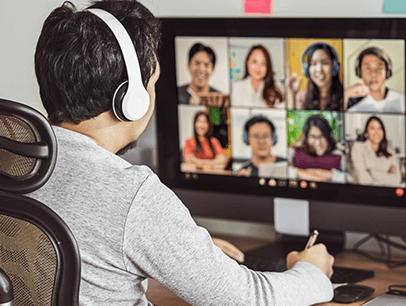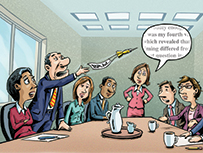
We’ve all experienced meetings that were electric, magical, and memorable. Then, there are those that feel fragmented, frustrating, and unfulfilling.
In deconstructing many “meeting fails,” I’ve found needless interruptions and distractions can quickly derail meeting quality. Of course, some interruptions are necessary, even critical. Think fire, flood, or a club member experiencing an emergency health issue. There may also be legitimate meeting “timeouts” to adjust the agenda, curtail a speaker who has exceeded a time limit, or to correct misinformation.
However, unnecessary interruptions distract speakers, interfere with meeting flow, turn listeners off, waste time, and stifle a meeting’s overall energy and impact. And if Toastmasters, who understand what a quality meeting should be like feel that way, imagine the impression guests take home from an unorganized, nonproductive meeting.
As the saying goes, “If something can go wrong, it will,” so don’t let disruptions rattle you. Handle them with calm confidence, civility, and firmness, and your members and guests will both enjoy a seamless, high-quality group experience.
Tactics to Stay on Track
Luckily, many online or in-person meeting interruptions can be avoided or minimized through careful planning and sticking to accepted meeting rules of order.
Time spent before the gavel drops also allows those with meeting roles to review the agenda timing and responsibilities, confirm handoffs, and troubleshoot technology and other logistics that could create disruptions during a meeting.
Given that interruptions are disruptive, we must always ask if the end justifies the means.
Many clubs establish “standing rules” to address issues like punctuality, politeness, and sharing the floor. Toastmasters subscribes to the traditional parliamentary principle that allows only one speaker at a time. Reminding members of this rule, in writing or aloud at the start of a meeting, keeps it foremost in everyone’s mind. These behaviors become an integral part of club culture, and are appreciated by members and guests alike.
Make sure the timer of the meeting has a timing tool. Online meeting timekeepers often use green-, yellow-, and red-colored backgrounds to alert presenters of elapsed time. Include the name of the color in writing, for those with color blindness. This non-verbal technique alerts speakers when their time is waning or lapsed.
If your club meets in an online or hybrid format, keep in mind that people are joining from a variety of electronic devices and platforms, and some may be using special equipment for their visual or hearing-impaired needs. Naturally, such a mix of methods can bring accessibility questions from attendees, often during the meeting. Make sure all attendees can hear, see, and participate fully in the meeting (preferably before it starts), regardless of location, circumstance, or ability. The Toastmaster magazine outlines some additional ideas on how to make meetings inclusive and accessible.
Given that interruptions are disruptive, we must always ask if the end justifies the means. For example, should you handle a meeting glitch on the spot? Could you set the issue aside and address it at a later point during or after the meeting?
Needless distractions … can quickly derail meeting quality.
Next, who is responsible for managing the interruption? Club officers and meeting role holders help ensure club meetings are timely and consistent in format. In most cases, the person in charge of the meeting at the time of an interruption is the one to intercede, if necessary. It could be the Toastmaster of the Day, the Table Topicsmaster, the General Evaluator, or another person.
What to Say?
The best interruptions, whether questions or statements, are short, direct, and polite. Whether prefaced by a raised hand at an in-person meeting or a raised hand symbol in your online meeting platform, consider the following phraseology:
- Pardon the interruption …
- If I might interject …
- I’m not familiar with this (word/example, etc.); could you please explain what this means?
- For the benefit of our newcomers and guests …
- To amplify what was just said …
- With your permission, I’d like to clarify …
- Due to the time, Mr. Toastmaster, might I suggest …
When speakers are running over time, smile and say firmly:
- I see we’re out of time. In the interest of time …
- And in conclusion/summation ...
- With time running short, let’s all give a round of applause to our speaker! (lead applause)
- We look forward to hearing the rest of your story at a future date.
- With a full agenda ahead of us, we need to stop here. Thank you! (lead applause)
- Given our tight schedule we’ll need to stop here. Please join me in applauding (speaker’s name).
- We see your time has run out. Thank you for yielding control back to (Toastmaster, Topicsmaster, next speaker, etc.)
Use a calm, firm voice to intercede in a disagreement between members:
- I respectfully suggest you table your discussion until after the meeting. Thank you for continuing your discussion outside of our official meeting.
- Let’s refer this to committee for further discussion between meetings.
- Recognizing the passion you each have around this issue, let’s schedule a special time to resume this discussion in a facilitated session.
- This issue deserves more time than we can allot to it today. Let’s schedule a time to revisit this issue when we can hear from all the parties. Please report back your progress/decision at our next meeting.
The ability to manage unforeseen meeting distractions politely yet firmly matters, especially when there are many speakers, a full agenda, and a passionate exchange of ideas. When handled effectively, everyone wins.
Craig Harrison, DTM a Past District Director, is now a professional speaker based in the San Francisco Bay Area. He cites joining Toastmasters in 1992 as one of the best decisions in his career and life. Email him at craig@expressionsofexcellence.com
Related Articles

Online Meetings
Disruptive Members or Overzealous Hosts?

Club Experience
How to Muzzle the Yakker

Online Meetings
Creating Inclusivity in Online Meetings

Presentation Skills



 Previous
Previous
 Online Manners Matter
Online Manners Matter
 Previous Article
Previous Article